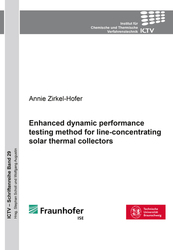| Departments | |
|---|---|
| Book Series (97) |
1382
|
| Nachhaltigkeit |
3
|
| Gesundheitswesen |
1
|
| Humanities |
2376
|
| Natural Sciences |
5408
|
| Engineering |
1798
|
| Engineering | 292 |
| Mechanical and process engineering | 863 |
| Electrical engineering | 690 |
| Mining and metallurgy | 30 |
| Architecture and civil engineering | 75 |
| Common |
98
|
|
Leitlinien Unfallchirurgie
5. Auflage bestellen |
|
Advanced Search
Enhanced dynamic performance testing method for line-concentrating solar thermal collectors (Volume 29) (English shop)
Annie Zirkel-Hofer (Author)Preview
Extract, PDF (440 KB)
Table of Contents, PDF (33 KB)
This thesis presents an enhanced dynamic performance evaluation method for line-concentrating solar thermal collectors. Due to its dispatchability and large storage capacity, concentrating solar power is considered of high relevance in the future renewable energy mix for both, electricity generation and industrial process heat supply. To fully exploit this potential and legitimize investments within this sector, a reliable and meaningful performance testing is essential. The proposed flexible, dynamic performance evaluation method allows for a significant reduction of testing time, effort, and consequently costs—especially for complex test conditions as they prevail for systems of larger dimensions such as line-concentrating collectors. For this reason, the present thesis comprehensively addresses diverse aspects of dynamic in situ performance testing. It includes a wide application of the elaborated procedure to diverse test collectors, ranging from small-scale medium-temperature linear Fresnel collectors to large-scale high-temperature parabolic troughs, considering different heat transfer fluids and receiver designs. It therefore proves to be a powerful and beneficial extension of the current testing standard to more complex test situations. Flexible and simultaneously reliable certification procedures are considered crucial for the further establishment of solar thermal technologies and their global acceptance.
| ISBN-13 (Hard Copy) | 9783736997868 |
| ISBN-13 (eBook) | 9783736987869 |
| Final Book Format | A5 |
| Language | English |
| Page Number | 222 |
| Edition | 1. |
| Book Series | ICTV-Schriftenreihe |
| Volume | 29 |
| Publication Place | Göttingen |
| Place of Dissertation | Freiburg |
| Publication Date | 2018-05-04 |
| General Categorization | Dissertation |
| Departments |
Mechanical and process engineering
Energy engineering |
| Keywords | Solarthermie, Konzentrierende Kollektoren, Leistungsprüfung, Solarfelder, In-situ Tests |








